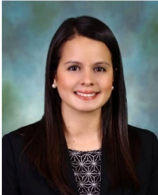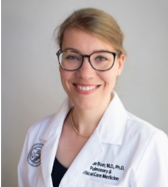For the Morgridge Family Foundation, investing in the health and wellness of our local neighborhood is just the beginning. Our longtime partner – and largest partner of the last ten years by gift size – National Jewish Health, provides world-class healthcare in Denver while disseminating resources, research, and experts to communities globally.
We’re shining the spotlight on the Morgridge Fellowship Program at National Jewish Health, which brings around 60 young post-doctoral students to National Jewish Health each year to learn the unique model of care and use it in their practices around the world. Today, there are more than 700 former Morgridge fellows practicing worldwide.
We had the opportunity to speak with two current fellows, Lillian Vargas Barahona and Esther de Boer, about their background, experiences as a fellow during COVID-19, and hopes for the future. Their answers have been lightly edited for clarity and length.
First, some background.

Lilian Vargas Barahona, MD, is an Infectious Disease Fellow working toward becoming an Infectious Disease Specialist. Originally from Tegucigalpa, the capital of Honduras, she received her medical education in Honduras before traveling to the United States in 2017 for an internal medicine residency at Houston Methodist Hospital in Texas.

Esther de Boer, MD PhD, is a Fellow in the Division of Pulmonary Sciences and Critical Care Medicine. Esther grew up and went to medical school in the Netherlands, where she became very interested in the research side of medicine. When she met researchers who invited her to conduct research with them, she accepted and moved to Birmingham, Alabama to conduct research and later in Dallas, Texas. She completed an internal medicine residency program at UT Southwestern in Dallas before coming to National Jewish Health.
What makes the Morgridge Fellowship Program at National Jewish Health unique?
Dr. Vargas Barahona: “The subspecialty of internal medicine goes through a process that’s called a match. You can apply to programs all over the country and are matched with one based on which programs fit your experience and interests. When I was looking at programs, the University of Colorado stood out because it gave the great opportunity of training at four different hospitals so you really get a very vast experience of different patient populations and different pathologies.”
“One of those hospitals was National Jewish, which is a one-of-a-kind opportunity in terms of infectious diseases training. National Jewish focuses on nontuberculous mycobacterial infections, which is a specialized aspect of infectious disease. Basically, especially uncommon and complicated patients are referred to National Jewish Health.”
“We work one-on-one with attendings who are specialists in their fields. They write guidelines for the nation, and even for the world, on how to treat these infections. So getting to work with the doctors and patients here is very unique.”
What inspired you to work in medicine and your specialty in particular?
Dr. Vargas Barahona: “I actually made up my mind about medicine really early in my life. I think I was probably eight years old. It’s so vivid to me. I was in a science class and learning about the circulatory system. I just felt that it was so fascinating to learn the science and then practice it on a daily basis. When it was time for me to pursue a degree, I had already made up my mind.”
“Then, I think seeing underserved populations is, in part, what brought me to infectious diseases.”
“I had to decide on my specialty before COVID came. So COVID did not make it into my decision to study infectious diseases. But even before COVID, there was still so much burden of disease in the world from infections. I think the pandemic has been a really clear example of that. I think it’s really important to see how one area, one population affects the rest of the world and how things like equity, distribution of healthcare and access to care impact health. Infectious disease tends to look at that.”
Dr. de Boer: “I wanted to serve a cause greater than myself and have always been interested in health and physiology. So I enrolled in medical school at the University of Groningen in the Netherlands.”
“When I was a medical student and in my residency, I thought I was going to do oncology because a lot of my research was in oncology. But then I realized as a second year resident that I liked pulmonary critical care more. In particular, the physiology that comes into play with pulmonary medicine and that there is so much still undiscovered within the pulmonary critical care arena.”
What’s a highlight or favorite moment from your time at National Jewish Health so far?
Dr. de Boer:” A highlight of my time at National Jewish Health so far was during the clinical part of my fellowship training and clinical rotation at the pulmonary physiology lab. I was given the opportunity to evaluate patients suffering from long-term consequences of SARS-CoV-2 referred to as “long COVID” or “post-acute sequelae of SARS-CoV-2 infection” who were referred for further evaluation with a cardiopulmonary exercise test (CPET). I analyzed and discussed the clinical data obtained within our CPET expert group at National Jewish.
“We reported our findings in a recently published manuscript in the [American Journal of Respiratory and Critical Care Medicine] and at three national conferences. I was awarded a second-place research award at the Respiratory Disease Young Investigators’ Forum and selected as a semi-finalist for the AMA research challenge.”
What’s next for you?
Dr. Vargas Barahona: “Well, I still have to finish my second year of training and my research project. I will be staying for a third year for advanced training in Transplant Infectious Diseases. After that, I will pursue a career in academic medicine where I can still put into service that knowledge of immunocompromised patients. I’ll probably look for jobs throughout the country.”
“In the meantime, being in Colorado has been a great opportunity to spend more time outside and get to know areas close to Denver and in the mountains. I have a son and a husband, so we also like to spend some time at home cooking and watching movies.”
What’s something that has surprised you during your time as a Fellow?
Dr. de Boer: “I’m starting to understand more and more about money streams and how much of our day-to-day activities are possible because of foundations, like [Morgridge Family Foundation.] That surprised me. I think that is such an amazing thing for people to do with their money, to give to a place like National Jewish so that we can pursue science and get more training in certain areas and set up clinics for patients and do all of these amazing things.”
“National Jewish is very unique in that it doesn’t feel like a machine or a production line. It’s very personalized, personal medicine people do here.”